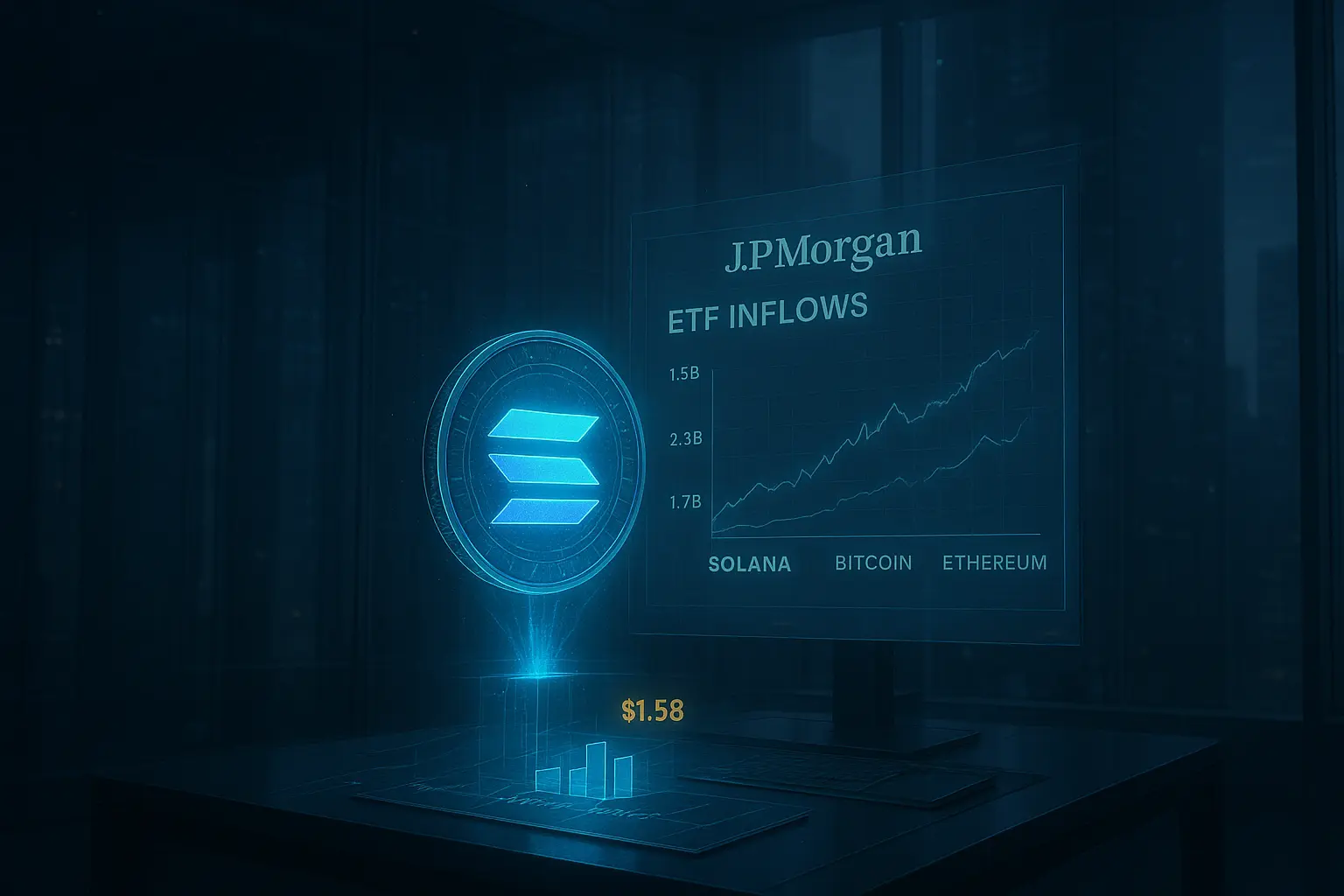JPMorgan analysts have issued a cautious outlook for Solana ETFs, projecting significantly lower institutional demand compared to Bitcoin and Ethereum funds as market saturation and investor exhaustion create headwinds for new crypto investment vehicles.
Diverging ETF Performance Expectations
The banking giant forecasts Solana ETFs will attract approximately $1.5 billion in net inflows during their inaugural year, a fraction of the capital flows captured by earlier cryptocurrency exchange-traded funds. This conservative projection reflects growing concerns about market capacity and diminishing enthusiasm for successive altcoin investment products.
Comparative ETF Performance
Bitcoin spot ETFs accumulated nearly $36 billion in inflows within their first year, while Ethereum funds generated $8.7 billion over the same period. Solana ETFs face the challenge of launching into an increasingly crowded marketplace.
Bitcoin Sets Unprecedented Benchmark
Spot Bitcoin ETFs launched in January 2024 and immediately established extraordinary performance standards that subsequent products struggle to match. These pioneering funds now manage close to $170 billion in assets, demonstrating institutional appetite for cryptocurrency exposure through regulated investment vehicles.
First-Mover Advantage Impact
JPMorgan's analysis attributes Bitcoin ETF success to mainstream recognition and established positioning as a digital store of value. The cryptocurrency's entrenched presence in institutional portfolios creates sustained demand that newer entrants find difficult to replicate.
Bitcoin's established position in institutional portfolios continues to bolster ETF inflows, likely leaving limited room for smaller coins such as Solana.
Asset managers launching subsequent cryptocurrency ETFs must navigate a landscape where investor attention and capital allocation are increasingly constrained by market saturation. The exceptional performance of Bitcoin funds has simultaneously validated the ETF structure while raising expectations to challenging levels.

Ethereum Demonstrates Moderate Trajectory
Ethereum ETFs commenced trading in May 2024, experiencing a more measured launch compared to their Bitcoin predecessors. Despite slower initial momentum, these funds accumulated $8.7 billion in their first year and currently manage over $31 billion in assets.
Smart Contract Ecosystem Recognition
The investment bank acknowledges Ethereum's dominant position within decentralized finance and smart contract platforms as a key differentiator. JPMorgan's report noted that Ethereum is perceived as the primary DeFi and smart contract cryptocurrency, providing a distinct value proposition that supports steady institutional interest.
Ethereum ETFs benefited from being only the second major cryptocurrency ETF category approved by regulators. This relative novelty generated investor curiosity before market fatigue became a significant factor. However, analysts now observe diminishing enthusiasm for additional altcoin ETF launches as the marketplace becomes saturated.
Solana Faces Multiple Headwinds
JPMorgan analysts explicitly stated that Solana ETFs are less likely to gain significant inflows compared to earlier cryptocurrency ETF launches. The report identifies several structural challenges that constrain potential demand for these investment products.
DeFi Positioning Deficit
Unlike Ethereum, Solana lacks established recognition as a dominant force in decentralized finance among institutional investors. This perception gap reduces appeal for asset allocators seeking exposure to blockchain infrastructure and smart contract platforms. The fragmentation of demand across multiple competing ETF products further dilutes potential inflows.
Initial Market Response
The SEC approved the Rex-Osprey Solana + Staking ETF in June, marking the first Solana-focused exchange-traded fund to receive regulatory clearance. The product raised $12 million on its initial trading day, a modest figure that supports JPMorgan's conservative outlook regarding sustained institutional demand.
Alternative Investment Vehicles
The report highlights competition from crypto treasury companies that offer indirect Solana exposure through equity investments. These firms potentially divert capital away from direct ETF products, creating an additional challenge for fund managers seeking to attract institutional allocations.
Market Fatigue Reality
JPMorgan emphasizes that investor exhaustion represents a critical obstacle for new digital asset funds. The successive launches of cryptocurrency ETFs have progressively diminished novelty appeal, making it increasingly difficult for later entrants to capture attention and capital commitments.
Technical Advantages Insufficient
While Solana offers superior transaction speed and lower costs compared to competing blockchain networks, JPMorgan's analysis suggests these technical advantages prove insufficient to drive strong ETF demand. The report concludes that operational efficiency alone cannot overcome broader market dynamics including competition, saturation, and investor preference for established cryptocurrencies.
The $1.5 billion first-year projection, though substantial in absolute terms, represents a significant step down from the trajectory established by Bitcoin and Ethereum funds. This forecast underscores the challenges facing asset managers launching cryptocurrency investment products in an increasingly mature and crowded marketplace where first-mover advantages and brand recognition play outsized roles in capital attraction.